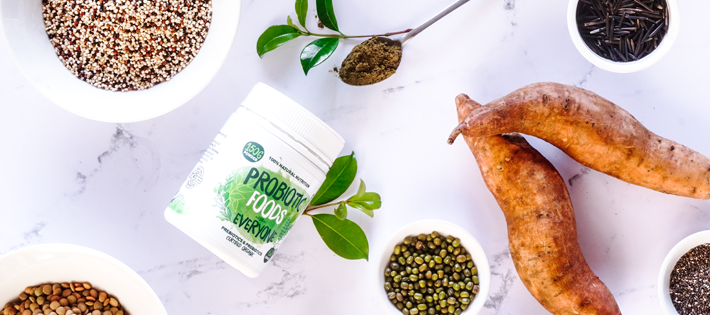This might sound crazy—to suggest eating more starch to feed your good bacteria. Won’t that just make me fat? Starch, more specifically resistant starch (RS) has been getting a lot of attention lately. Since the 80’s it has been known that resistant starch escapes digestion and travels to the colon where it feeds good bacteria and heals the gut. The secret is out. RS is good for us!
Resistant starch is a type of carbohydrate found in many grains like pasta and rice, vegetables like potatoes, lentils, beans, unripe bananas, papaya and mangoes. When pasta is cooked and cooled the starch molecules are rearranged, changing the chemical structure. You can’t digest it but your hungry bacteria can!
Gut bacteria ferment resistant starch, and turn it into a fat called butyrate. This is actually great news even though it doesn’t sound it. Starch turning to fat in your gut? Yes! But it’s the hungry bacteria that feast on buyrate not your fat cells. Research shows it can do many more things as well: stimulate blood flow to the colon, help absorb minerals and inhibit the growth of bad bacteria. Resistant starch can also prevent absorption of toxic/carcinogenic compounds, which can protect against bowel cancer.
At Probiotic Foods, we talk a lot about the benefits of dietary fibre for a healthy gut. Probiotic Foods are rich in fermented food fibres that feed your good gut bugs. Just imagine if you also actively change your diet to include more of these resistant starches, what results you might get.
Benefits of eating resistant starch
- Improved feeling of satisfaction and fullness, eat less at meal times
- Better blood sugar control, less insulin required—great for diabetics
- Balanced energy levels
- Better digestion—RS bulks and softens stool, helps regularity
- Can help reduce fat stores as RS feeds bacteria not fat cells
Foods with resistant starch
Probiotic Foods contain fermented fibre from rice, lentils, sweet potato, and seeds rich in RS. RS is high in cooked and cooled potatoes/sweet potatoes, rice, pasta, lentils and beans that have been cooked and cooled including canned beans. Plantains (the less sweet, more starchy sister of the banana) and unripe bananas and other grains like oats and barley are also good sources.To get the most from RS, choose whole, unprocessed sources of carbohydrate such as whole grains, fruits, vegetables, and beans/legumes. RS is best consumed when part of a meal as in cooled and if desired, gently warmed potato, rice or pasta added to a salad. Start to gradually increase the amount you consume and avoid any of the chemically modified, synthetic and commercialized RS products, such as ‘Hi-Maize Resistant Starch’.
Word of warning
If you have an overgrowth of bacteria in your small intestine, like in the case of SIBO (Small Intestinal Bowel Overgrowth), you may be intolerant to starch. Address your gut imbalance with a SIBO diet before adding any extra starch. Also choose your grains carefully according to your intolerances, blood type and natural preference. Check in with your body using our 30 Day Self-Check Questionnaire.
Try this recipe for green papaya/mango wild rice salad and add a sprinkle of Probiotic Foods for a complete gut-loving meal for you and your family.
DISCLAIMER: Medical disclaimer: This blog provides general information and discussion about gut health and related subjects. Whilst every effort is made to present up to date information, the area of gut health and the microbiome are changing constantly. We welcome any comments or suggestions. By reading this blog, you agree not to use this blog as a substitute for medical advice to treat any medical condition in either yourself or others. The author encourages you to consult a health professional before making any health changes, especially any changes related to a specific diagnosis or condition. No information contained in these pages should be relied upon to determine diet, make a medical diagnosis, or determine treatment for a medical condition. The information is not intended to replace a one-on-one relationship with a qualified healthcare professional and is not intended as medical advice. Links to other (‘third party’) web sites are provided to you to expand understanding of the subject and are not an endorsement or recommendation by the author for the services, information, opinion or any other content on the site or as an indication of any affiliation, sponsorship or endorsement of such third party web sites. Your use of other websites is subject to the terms of use for such sites. By reading this blog, you agree that you are responsible for your own health decisions. NO information contained in this blog should be used to diagnose, treat, prevent or cure any disease or condition.The contents of these blogs are copyright and available to wholesale partners for free. We encourage you to share with your team and customers on the basis that ‘Probiotic Foods Wholesale Pty Ltd’ is the acknowledged author within the actual media that the blog is reproduced.

